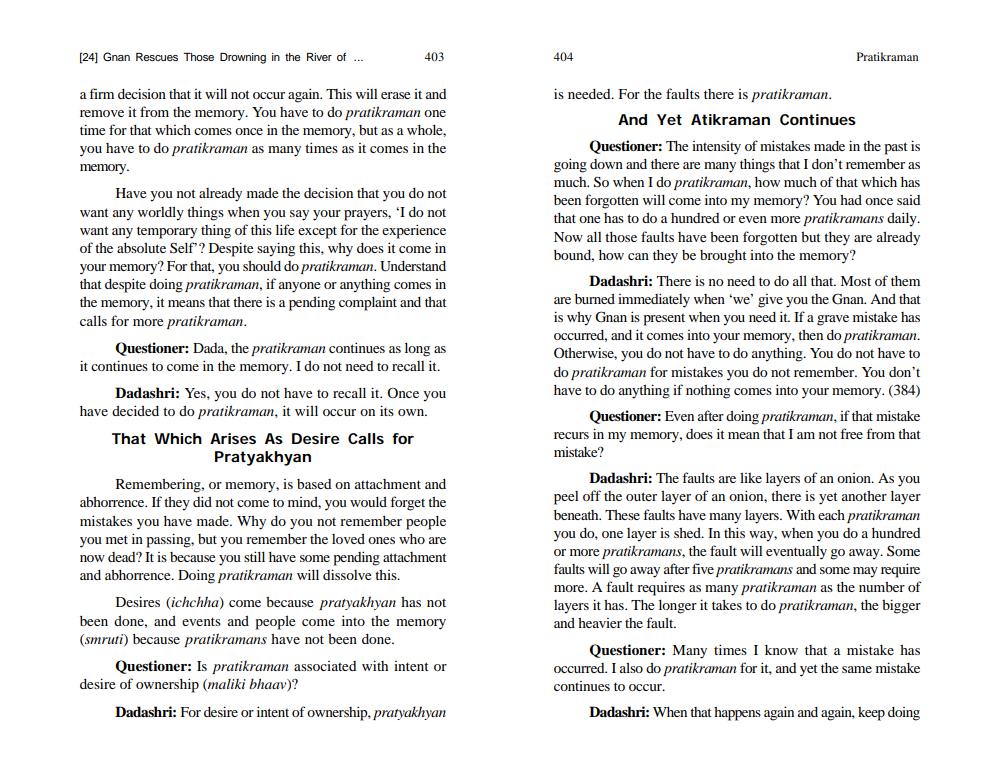________________
[24] Gnan Rescues Those Drowning in the River of ...
403
a firm decision that it will not occur again. This will erase it and remove it from the memory. You have to do pratikraman one time for that which comes once in the memory, but as a whole, you have to do pratikraman as many times as it comes in the memory.
Have you not already made the decision that you do not want any worldly things when you say your prayers, 'I do not want any temporary thing of this life except for the experience of the absolute Self"? Despite saying this, why does it come in your memory? For that, you should do pratikraman. Understand that despite doing pratikraman, if anyone or anything comes in the memory, it means that there is a pending complaint and that calls for more pratikraman.
Questioner: Dada, the pratikraman continues as long as it continues to come in the memory. I do not need to recall it.
Dadashri: Yes, you do not have to recall it. Once you have decided to do pratikraman, it will occur on its own.
That Which Arises As Desire Calls for Pratyakhyan
Remembering, or memory, is based on attachment and abhorrence. If they did not come to mind, you would forget the mistakes you have made. Why do you not remember people you met in passing, but you remember the loved ones who are now dead? It is because you still have some pending attachment and abhorrence. Doing pratikraman will dissolve this.
Desires (ichchha) come because pratyakhyan has not been done, and events and people come into the memory (smruti) because pratikramans have not been done.
Questioner: Is pratikraman associated with intent or desire of ownership (maliki bhaav)?
Dadashri: For desire or intent of ownership, pratyakhyan
404
Pratikraman
is needed. For the faults there is pratikraman.
And Yet Atikraman Continues
Questioner: The intensity of mistakes made in the past is going down and there are many things that I don't remember as much. So when I do pratikraman, how much of that which has been forgotten will come into my memory? You had once said that one has to do a hundred or even more pratikramans daily. Now all those faults have been forgotten but they are already bound, how can they be brought into the memory?
Dadashri: There is no need to do all that. Most of them are burned immediately when 'we' give you the Gnan. And that is why Gnan is present when you need it. If a grave mistake has occurred, and it comes into your memory, then do pratikraman. Otherwise, you do not have to do anything. You do not have to do pratikraman for mistakes you do not remember. You don't have to do anything if nothing comes into your memory. (384)
Questioner: Even after doing pratikraman, if that mistake recurs in my memory, does it mean that I am not free from that mistake?
Dadashri: The faults are like layers of an onion. As you peel off the outer layer of an onion, there is yet another layer beneath. These faults have many layers. With each pratikraman you do, one layer is shed. In this way, when you do a hundred or more pratikramans, the fault will eventually go away. Some faults will go away after five pratikramans and some may require more. A fault requires as many pratikraman as the number of layers it has. The longer it takes to do pratikraman, the bigger and heavier the fault.
Questioner: Many times I know that a mistake has occurred. I also do pratikraman for it, and yet the same mistake continues to occur.
Dadashri: When that happens again and again, keep doing




